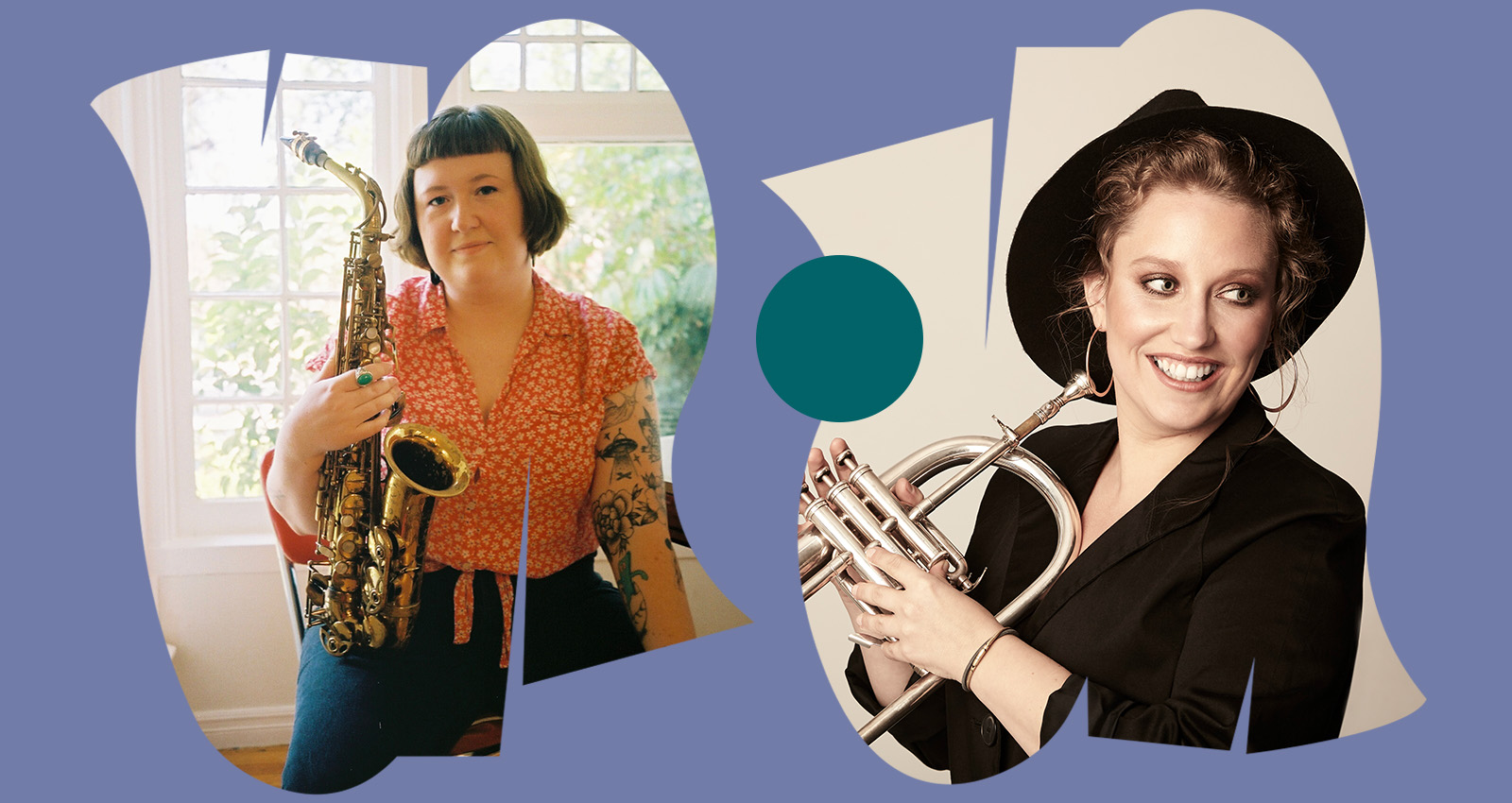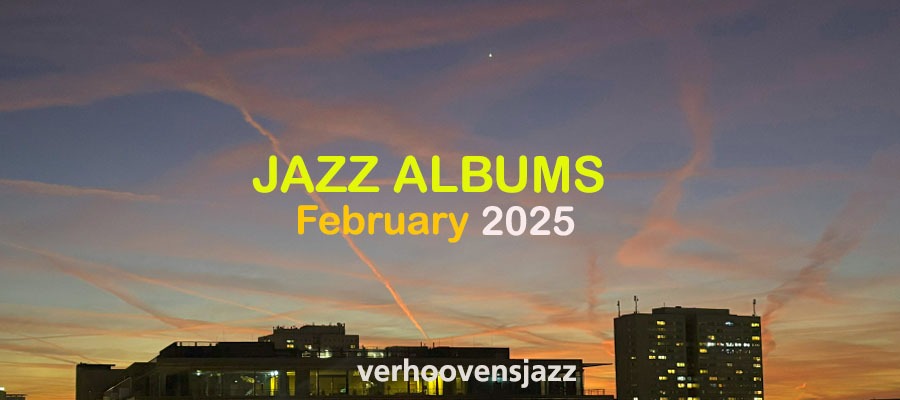
Asha Parkinson – Possession
Asha Parkinson – Alto, Soprano, Tenor Saxophones, Compositions, Bandleader
Rebecka Edlund – Voice | Meera Maharaj – Flute | Simeon May – Baritone Saxophone, Bass Clarinet | Christie Smith – Trumpet | Konstantinos Glynos – Qanun | Abbie Davis – Violin | Chloe Meade – Violin | Andrew Lidell – Viola | Cubby Howard – Cello | Charlie Heywood – Guitar | Alex Wilson – Piano | Hamish Nockles-Moore – Bass | Alex Taylor – Drums | Gareth Lockrane – Guest Flute, Alto
release 20.09.2024 | ubuntu
Possession beschäftigt sich mit Themen von obsessiver Liebe über urbane Trance bis hin zu mystischer Inspiration, Hingabe. Darüber hinaus greift es auf lyrische Motive von traditionellen Märchen bis hin zu Tolstoi, Huxley, Jalāl al-Dīn Rumi und dem Vaterunser im aramäischen Original zurück
Liner Notes
Mitten rein geht es in Urban Phantasy – keine Umschweife, kein vorsichtiges Antasten, geradezu in die Vollen – aus den Vollen. Um ziemlich abprupt auszublenden und eine andere Gangart hinzulegen, mit Distant Devotion – die mit einigen Vorschusslorbeeren versehene Asha Parkinson aus England legt ihr erstes großformtiges Werk vor, da geht es, unschwer zu erraten um Arrangement, Komposition und Ablauf der Arrangements zueinander, für das Big Band verwöhnte Ohr eine unmittelbare Herausforderung, die sich über die britische Tradition erklären ließe und zu einem Spiegelbild führt, Mirror Image – angekündigt ist das Werk als Debut, obwohl ihm ein halbstündiges Werk vorausgeht (Onwards: Asha Parkinson’s Kalpadruma)
Es ist von Obsessionen die Rede, vom Stadtleben, vom Wirbel der Instrumente untereinander, die Stimme Rebecka Edlunds hat so einige Dynamiken und Richtungswechsel auszubalancieren und transportiert dabei das Straucheln im Großstadttaumel mit seinen Unberechenbarkeiten. Und hält doch stand, im guten Ton. Was im ersten Hörgang wirkt wie ein unkalklierbares Risiko, auf das sich Orchester und Zuhörende einlassen, benötigt entsprechend einige Durchläufe, um nicht im Gewühl der ewigen Baustelle stecken zu bleiben – auch musst du ziemlich impulsiv veranlagt sein, so einen Daueraufenthalt am pulsierenden Baustellenlärm mitzugehen – es erwartet dich eine aufregende Reise – sagen die einen, es katapultiert dich ins Zentrum der Baustelle, sagen die anderen – so hektisch wie zeitgemäß in jeder Minute sich windend, wendend und aus- wie umbrechend – Ruhe findest du im Café oder Restaurant – vielleicht, schon kommt wieder einer mit seinem Instrumentenkoffer und erzählt vom eigenen Maelstrom. Sehr fordernd, das Ganze – auch wandelt sich die Instrumentierung, von der Stimme zum Qanon, einem Zitter-ähnlichen Saiten-Instrument mit einem für Asha Parkinson mehr als interessanten Sound – dem sie einiges an Raum zugesteht
– wenn du Geduld hast und Muse, dir etwas anzuhören, was eben nicht konventionell ist, bist du in einem durchweg interessanten Selbstbespiegelungsprozess der Musik unterwegs – du hast glücklicherweise die Chance, die Aufnahme mehrmals zu hören – im letzten Stück, Perment Verse, hast du sogar ein dynamisches Momentum, das mit fettem Groove daherkommt und vorstellbar im Radio rauf und runter läuft: in unseren Breiten wird man wahrscheinlich geschockt an die Seitenlinie treten und rufen: jaja, schon was von Benjamin Britten gehört – vielleicht erschließt es sich dir darüber – nein so weit brauchst du nicht zurück, du darfst in die Breite denken, in ihrem Kontext: der Einfluss von Maqam-Jazz, dem fernöstlichen Sound und dem jeder einzelnen ihrer Band-Mitglieder aus der Formation Kalpadruma, was so viel bedeutet wie Lebensbaum, aber auch Bastelstube, scheint Asha Parkinson stark inspiriert eine abwechslungsreiche und nicht immer einfache aber nachdrückliche Note zu setzen, die sich, mehrfach gehört, im Ohr festsetzt und neue Maßstäbe errichtet vor dem Hintergrund großformatiger Jazz-, World- oder Bigband-Musik
: für Feinschmecker dieser Spielart ein Muss.
Referenzen: londonjazznews | jazzfuel | londonjazznews | Interview jazz-fun | allaboutjazz
Asha Parkinson
‘Possession’ delves into themes of obsessive love to urban trance to mystical inspiration to devotion and beyond, drawing on lyrical motifs from traditional fairy tales to Tolstoy, Huxley, Jalāl al-Dīn Rumi and the Lord’s Prayer in the original Aramaic. Liner Notes
It’s straight in at Urban Phantasy – no digressions, no cautious probing, straight into the full – from the full. To fade out rather abruptly and change gear, with Distant Devotion – Asha Parkinson from England, who has received so much advance praise, presents her first large-scale work here, which, as you can easily guess, is about arrangement, composition and the sequence of the arrangements in relation to each other, an immediate challenge for the big band-spoilt ear, which can be explained by the British tradition and ultimately leads to a Mirror Image – the work is announced as a debut, although it is preceded by a half-hour work (Onwards: Asha Parkinson’s Kalpadruma)
There is talk of obsessions, of city life, of the swirl of instruments among each other, Rebecka Edlund’s voice has to balance out a number of dynamics and changes of direction and conveys the stumbling in the big city frenzy with its unpredictability. And yet it holds its own, in a good tone. What seems like an incalculable risk for the orchestra and listener at first listen requires a few runs through in order not to get stuck in the hustle and bustle of the eternal building site – you also have to be pretty impulsive to go along with such a permanent stay at the pulsating building site noise – an exciting journey awaits you, some say, it catapults you into the centre of the construction site, say others – as hectic as it is contemporary, twisting, turning and breaking and turning again every minute – you’ll find peace and quiet in a café or restaurant – perhaps someone will come along with his instrument case and tell you about his own Maelstrom. The whole thing is very demanding – the instrumentation also changes, from the voice to the qanon, a tremolo-like string instrument with a sound that is more than interesting for Asha Parkinson – to which she gives a lot of space
if you have the patience and the muse to listen to something that is not conventional, you are in for a thoroughly interesting process of self-reflection in music – fortunately you have the chance to listen to the recording several times – in the last piece, Perment Verse, you have such a dynamic momentum that comes along with a fat groove and can be imagined running up and down the radio – only: in our latitudes you will probably step to the sidelines in shock and shout: yes yes, you’ve heard of Benjamin Britten – maybe it will open up to you – no, you don’t need to go back that far, you can think broadly, in context: the influence of maqam jazz, the Far Eastern sound and that of each of her band members from the formation Kalpadruma, which means tree of life, but also tinkering room, Asha Parkinson seems strongly inspired to set a varied and not always simple but emphatic note, which, heard several times, sticks in the ear and sets new standards against the background of large-format jazz, world or big band music
: a must for connoisseurs of this artwork.











